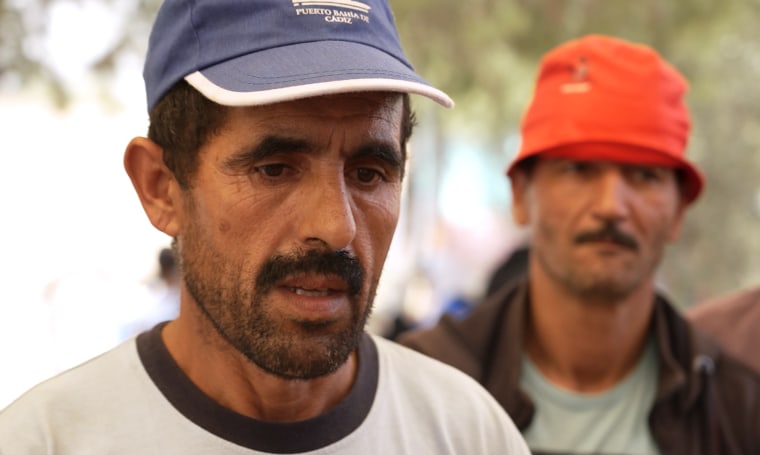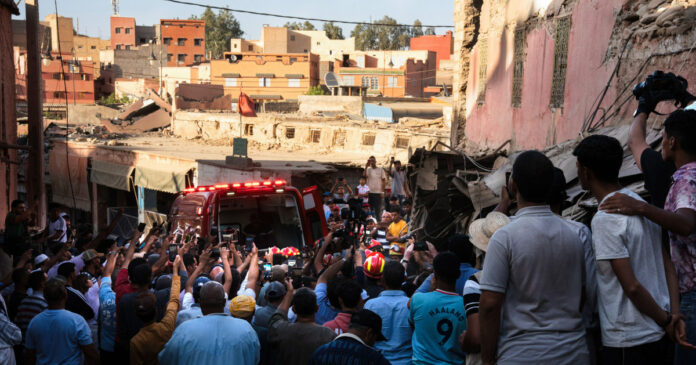AMIZMIZ, Morocco — It was a moment of devastating coincidence.
Just as Ali’s daughter blew out the candles on her 21st birthday cake, a fault ruptured 11 miles beneath Morocco’s High Atlas Mountains unleashing forces so violent that villagers did not at first understand what was going on.
“We were partying,” said Ali, 50. “And at the blow of the candle, a terrible sound started like an extraterrestrial engine. We couldn’t grasp what was happening.”
“In a word, it seemed like doomsday,” he said on Tuesday, after he and his family managed to escape the house. Many of his friends in the town were not so lucky, he said.
The magnitude 6.8 earthquake that struck late Friday night razed entire villages, killing 2,900 people and counting, with bodies still being pulled from the pancaked buildings.
In the tourist town of Amizmiz, 15 miles away from the epicenter, half an hour earlier Ali had been sitting in a café with a friend before leaving for his daughter’s birthday celebrations.
Cafe Anmoggar, a Berber word meaning “The Gathering,” is now rubble. And for his friend who stayed behind, “It was his last coffee,” said Ali on Tuesday, still shaken four days after the quake and declining to give his last name.
People in this remote, mountainous region are not only reeling from the grief of losing loved ones and homes, they must also now grapple with the practical challenges ahead.
Food, water medicine and shelter are an immediate concern, but perhaps more pressing in the long run, given the mass homelessness, is a looming winter that will bring low temperatures and a thick blanket of snow over this country’s dramatic peaks and slopes.
The Red Cross estimates some 300,000 people have been impacted in some way by the quake, untold thousands of whom are homeless after entire villages were destroyed. Many of these people are now sleeping in tents hastily erected on the rocky ground. These dwellings are cramped and uncomfortable in September but potentially deadly in just a few months’ time.
Among those inside is Sanaa Ait Moma, 35, who has been sleeping in one of these encampments with her two children after they managed to escape their house just before the quake brought it down.
“My children are in shock. They cry, ‘Mom, mom, mom,’ all the time,” she said, sitting at the door of a 10-foot-by-10-foot tent. It’s one of a cluster of around 50 in Amizmiz, where she and others sleep on floor mats protecting them from the earth.
Still grieving dead friends, her mind must also turn to what’s next for her family. She cannot return to her ruined home and believes she could be here for months, although “in the winter you cannot live here because it gets very cold.”
Avoiding that will require a colossal reconstruction and rehousing effort, on top of the relief and recovery mission that has already been launched.

It’s a response that has drawn some criticism internationally, after Morocco said it was only accepting help from four “friendly” countries and others, including the United States, said their offer of assistance had gone unanswered.
Some, including Ali and Ait Moma, feel generally positive about the efforts of their government. Others are vehemently less so.
“All the people, even the children, are very angry because we don’t feel happy with this situation,” said Abdelhak Ait Bouhfid, 52, whose family are crammed alongside three others in a tent in the village of Sidi Hssaine, less than two miles outside Amizmiz.
His house was destroyed and all his livestock were killed, but his wife and five children made it out alive. Their tent is already cold at night and he fears the inevitable mud that will ensue if rain comes later this week.
“The government has not come in, just to see how we feel,” he said. “They were completely absent.”Raf Sanchez and Susan Archer reported from Amizmiz, Morocco. Alexander Smith reported from London.


